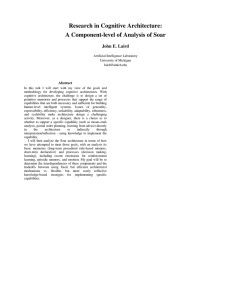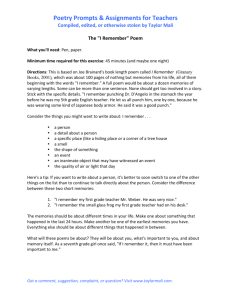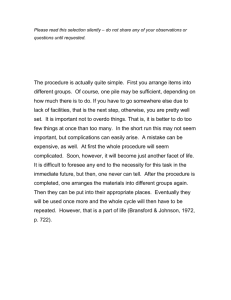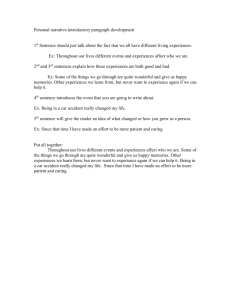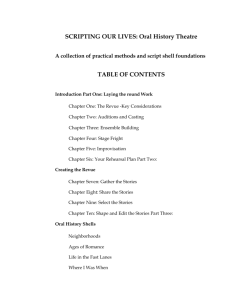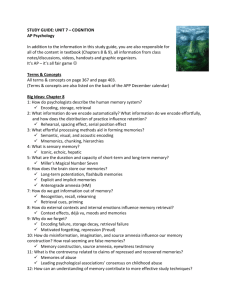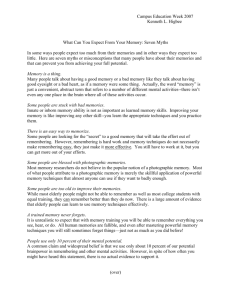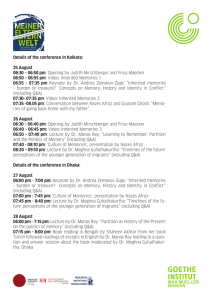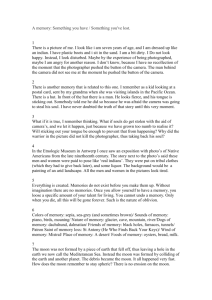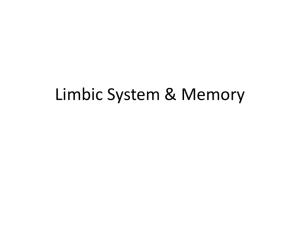Memory Memory Modal Model of Memory
advertisement
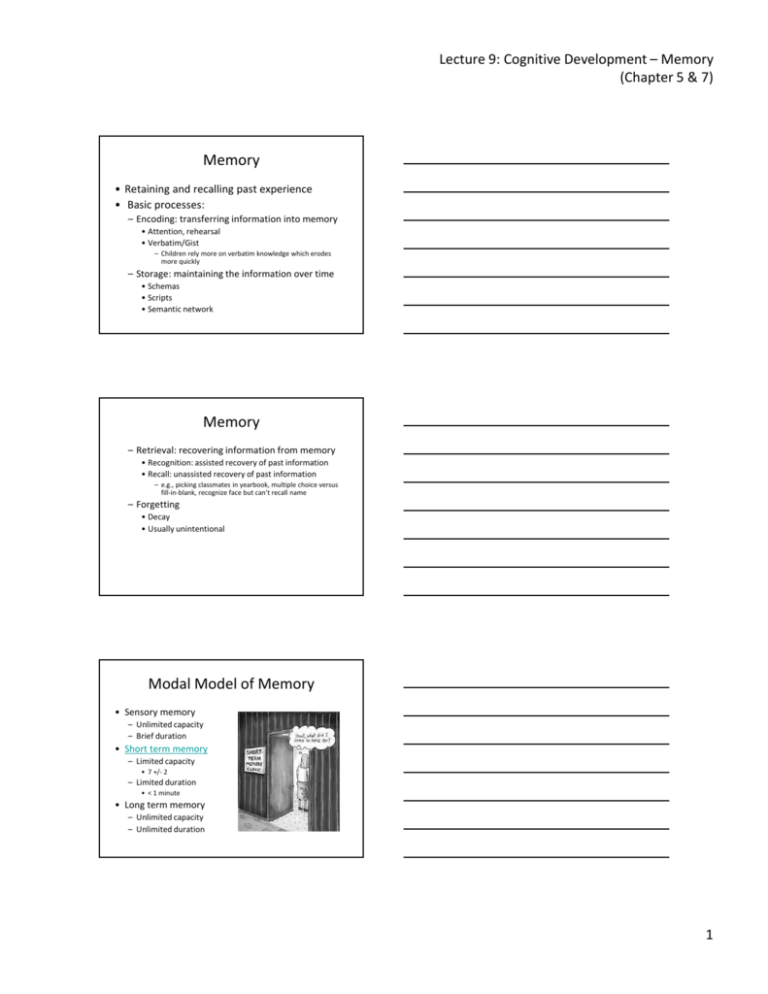
Lecture 9: Cognitive Development – Memory (Chapter 5 & 7) Memory • Retaining and recalling past experience • Basic processes: – Encoding: transferring information into memory • Attention, rehearsal • Verbatim/Gist – Children rely more on verbatim knowledge which erodes more quickly – Storage: maintaining the information over time • Schemas • Scripts • Semantic network Memory – Retrieval: recovering information from memory • Recognition: assisted recovery of past information • Recall: unassisted recovery of past information – e.g., picking classmates in yearbook, multiple choice versus fill-in-blank, recognize face but can’t recall name – Forgetting • Decay • Usually unintentional Modal Model of Memory • Sensory memory – Unlimited capacity – Brief duration • Short term memory – Limited capacity • 7 +/- 2 – Limited duration • < 1 minute • Long term memory – Unlimited capacity – Unlimited duration 1 Lecture 9: Cognitive Development – Memory (Chapter 5 & 7) Modal Model of Memory Storing Memories • Scripts: memory for event sequence – e.g., eating at a restaurant, going to bed • Schemas: memory for category – Prototype: average example – e.g., birds, chairs, racial profile, self • Children tend to remember recurring events well but fail to remember specific details • E: You went camping, wow! What did you do? • C: We eat dinner, then we waked up, then we eat breakfast. Schema Example The procedure is actually quite simple. First you arrange items into different groups. Of course, one pile may be sufficient depending on how much there is to do. If you have to go somewhere else due to lack of facilities that is the next step; otherwise, you are pretty much set. It is important not to overdo things. That is, it is better to do too few things at once than too many. In the short run this may not seem important but complications can easily arise. A mistake can be expensive as well. At first, the whole procedure will seem complicated. Soon, however, it will become just another facet of life. It is difficult to foresee any end to the necessity for this task in the immediate future., but then, one never can tell. After the procedure is completed one arranges the materials into different groups again. Then they can be put into their appropriate places. Eventually they will be used once more and the whole cycle will then have to be repeated. However, that is part of life. 2 Lecture 9: Cognitive Development – Memory (Chapter 5 & 7) Activating the Schema “Doing the Laundry” The procedure is actually quite simple. First you arrange items into different groups. Of course, one pile may be sufficient depending on how much there is to do. If you have to go somewhere else due to lack of facilities that is the next step; otherwise, you are pretty much set. It is important not to overdo things. That is, it is better to do too few things at once than too many. In the short run this may not seem important but complications can easily arise. A mistake can be expensive as well. At first, the whole procedure will seem complicated. Soon, however, it will become just another facet of life. It is difficult to foresee any end to the necessity for this task in the immediate future., but then, one never can tell. After the procedure is completed one arranges the materials into different groups again. Then they can be put into their appropriate places. Eventually they will be used once more and the whole cycle will then have to be repeated. However, that is part of life. Memory Changes over Time • Memory evident early, even prenatally • Memory tends to improve with age – 30-50% Hippocampal increase in children – Metamemory • Mnemonics, rehearsal – Different types of memory develop differently • E.g., Children have good location memory, weak list memory Types of Memories • Implicit memories: unconscious – H.M., Clive Wearing, Memento • Explicit memories (declarative): conscious – – – – Semantic: facts (e.g., capital of AL) Procedural: how to (e.g., tie shoes) Episodic: events (e.g., birthday party) Autobiographical: personal life story • Infantile amnesia: poor retention of early personal memories 3 Lecture 9: Cognitive Development – Memory (Chapter 5 & 7) Memory Problems • Infantile Amnesia – Theory of mind: immature understanding of mind – Sense of self: immature sense of self – Narrative ability: poor story-telling • False memories – Source Monitoring • e.g., Leading questions, real versus imagined (kids touching nose) – Suggestibility • e.g., Misinformation (cars bumped versus smashed), Sam Stone (100 clinicians couldn’t tell truth from lie), finger in mousetrap (initially no, 3 month later yes) Memory Problems • Forgetting • Eyewitness testimony – Witnesses interviewed 10X before trial – 100K children testify in cases annually – 40% of children testifying in sexual abuse cases are under 5 years old • Memory is efficient, but inaccurate – e.g., flashbulb memories (Challenger 24 hrs & 2.5 yrs, 40% inaccurate, many denied initial report) – e.g., verbatim versus gist 4
